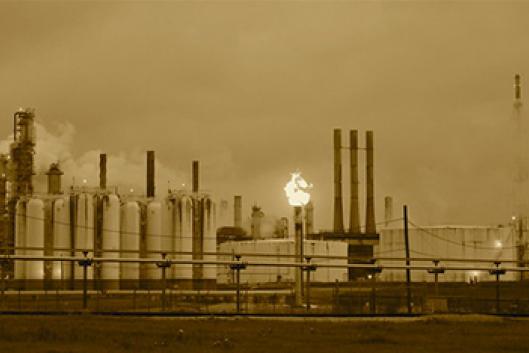Polluting corporations tell stories about reaching “Net-Zero” emissions while planning to continue, or even increase, destruction and exploitation. Offsets are at the centre of these stories. Of late, offsetting is also being championed by the financial industry. It's time to put an end to this dangerous illusion!
Over the past three decades, all sorts of adjectives that sound environmentally-friendly have been added to the word capitalism (or growth, or economy). Why? It helps to spin a structural problem into a challenge for which a (technical) solution can be promised. Offsets are offered as the ‘silver bullet’ that will solve the climate problem without denting corporate profits or the burning of fossil fuels. Offsets have been heavily promoted by the conservation industry, including NGOs like WWF and The Nature Conservancy; governments from many industrialized countries; the financial industry, including the World Bank; and many corporations, including within the fossil fuel and aviation sectors.
Most polluting corporations have endorsed offsetting as part of their Net-Zero climate plans. On their websites, corporate criminals like Shell or Eni tell stories about 'commitment to protecting forests' and investing in 'natural solutions' – while they plan to continue, or even increase exploitation of fossil fuels well beyond 2050. No hypocrisy seems too cheap to protect corporate profits from fossil fuel burning. Many companies from the aviation and food industries are also banking on offsets to protect their destructive business model. Governments, meanwhile, are busy preparing the legal framework for this mad offsetting illusion.
More than 30 years of extensive documentation, evidence and analysis from community organisations, environmental justice networks, social movements and academic studies exposing the structural flaws, the contradictions and the corporate interests behind the illusion of offsets is being dismissed to protect corporate profits!
Even worse - the illusion of offsetting is of late being championed by the financial industry.
Mark Carney, who spent 13 years at the private bank Goldman Sachs, was former governor of the Bank of Canada and the Bank of England, is now an influential investor and UN special envoy for climate action and finance. In November 2020, a private sector-led initiative aimed at scaling up the voluntary carbon markets and led by Carney launched a 98-page “Consultation Document.” The document mentions the word “offset” 238 times, and mentions “fossil-fuel energy” once. (1) It is an ode to carbon markets.
The initiative, called “Taskforce on scaling voluntary carbon markets”, has been launched at a convenient time. Many companies, as destructive and polluting as Shell, Unilever, Tata Steel and BP, have made commitments to turn their supply chains into operations that produce Net-Zero emissions. But Net-Zero emissions does not mean zero emissions. The idea of Net-Zero depends on the massive use of offsets, which in turn means that fossil fuels will keep being burnt, while corporations promote themselves as carbon-neutral, green, sustainable or any other adjective that sound environmentally-friendly but do nothing more than greenwash destruction.
Companies are being spurred into action by Larry Fink, the chief executive of the world's largest asset manager, BlackRock. In January 2021, Fink announced in the company's Annual Letter that BlackRock will be expecting road maps to Net-Zero emissions by 2050 from all the companies it invests in. (2) BlackRock is a major shareholder in agribusiness, real estate, energy, mining and other companies, and its managers sit on the boards of several big conservation organizations. (3)
It is crucial to remember that Offsets do not reduce emissions. At best, Offsets displace emissions. This means that, for example, to reach Net-Zero emissions, a company emitting 10 tonnes of CO2 in place A, would need to implement or buy credits from an offset project that absorbs 10 tonnes of CO2 in place B, or from an offset project that avoids to emit 10 tonnes of CO2 that were at risk of being released in place C. This logic ignores the uniqueness of any one place; offsetting is based on the false assumption that the life and interconnections of place A, B and C can be replaced, swapped or recreated. This ‘displacement of emissions’, has in most cases been an absolute failure in climatic terms. (4) What is worse, as WRM and others have denounced on countless occasions (5), most offset projects have resulted in conflicts, land grabs, extreme violence and destruction of livelihoods and communities’ lives. People directly affected by the imposition of these projects have rarely been properly informed and the territories and life spaces they depend upon have been destroyed, fenced off or heavily contaminated.
The reality of offsets is far away from the illusion it sells. Offsetting provides a tool for corporations to keep profiting from a capitalist system hooked on fossil fuels. This also means big business for conservationist NGOs busy offering land under their management as offsets to the world's dirtiest corporations. For the countless communities whose territories are locked up in offset projects or for those affected by the continuation of business as usual, however, it means destruction and violence. The recent renewed interest in offsets threatens to become a massive land grab.
It's time to redouble efforts to expose the dangerous illusion that is fed by offsetting. And to support those forest-dependant populations and peasant communities who have long been using and protecting their land, forests and diversity. Their struggles against corporate destruction have not been fooled by the ever-changing list of adjectives with an environmentally-friendly ring to the ear that are used to greenwash destruction.
(1) REDD-Monitor, Mark Carney’s Taskforce on Scaling Voluntary Carbon Markets: The global financial elite’s plan to profit from the climate crisis while maintaining business as usual for Big Oil, 2021
(2) BlackRock, Net zero: a fiduciary approach, 2021
(3) Focus on the Global South, Rogue Capitalism and the Financialization of Territories and Nature, 2020
(4) The Corner House, Carbon Markets Are not Designed to Reduce Emissions, 2020
(5) WRM, Mercantilization, REDD and other false solutions
